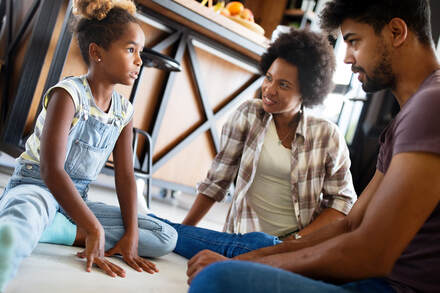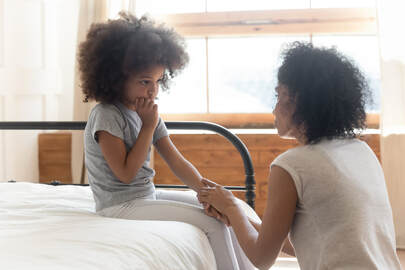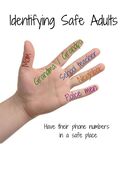
What’s the big deal about body parts names? you might be wondering. They’re only words. But as you may know, words have power and, there is nothing to be ashamed about using the correct words to name our own body. The key is to choose terms that are respectful and easily understood. This can include the correct medical terms for body parts or another term that is equally respectful.
Sharing the proper names for body parts is healthy and protective. For a small child, it gives him words that others will clearly understand should he need to communicate about toileting concerns, pain or illness, or that someone is touching him inappropriately.
Having the proper names for body parts gives children the vocabulary, confidence, knowledge, and ownership of their bodies right from the start.
Perhaps most importantly – proper names for body parts, once we’ve said them a few times, begin to disassemble at least one of the many taboos that allow for sexual abuse to take place. And that is one of the most important and lasting lessons we can give our children.
Parents do not always talk to their children about body safety early enough. They think kids are too young. It is too scary. But it is never too soon, and it doesn’t have to be a scary conversation. As adults, we are in a position to help prevent abuse from happening to our kids, and to empower them to disclose if it does. One of the most important prevention tools, and the most simple and effective, is to teach them body autonomy.
Sharing the proper names for body parts is healthy and protective. For a small child, it gives him words that others will clearly understand should he need to communicate about toileting concerns, pain or illness, or that someone is touching him inappropriately.
Having the proper names for body parts gives children the vocabulary, confidence, knowledge, and ownership of their bodies right from the start.
Perhaps most importantly – proper names for body parts, once we’ve said them a few times, begin to disassemble at least one of the many taboos that allow for sexual abuse to take place. And that is one of the most important and lasting lessons we can give our children.
Parents do not always talk to their children about body safety early enough. They think kids are too young. It is too scary. But it is never too soon, and it doesn’t have to be a scary conversation. As adults, we are in a position to help prevent abuse from happening to our kids, and to empower them to disclose if it does. One of the most important prevention tools, and the most simple and effective, is to teach them body autonomy.

Here are things 10 things that could help you to teach your kids a very important lesson about their own safety:
"1. Talk about body parts early.
2. Teach them that some body parts are private.
3. Teach your child body boundaries.
4. Tell your child that body secrets are not okay.
5. Tell your child that no one should take pictures of their private parts.
6. Teach your child how to get out of scary or uncomfortable situations.
7. Have a code word your children can use when they feel unsafe or want to be picked up.
8. Tell your children they will never be in trouble if they tell you a body secret.
9. Tell your child that a body touch might tickle or feel good.
10. Tell your child that these rules apply even with people they know and even with another child."
10 Ways to Teach Your Child the Skills to Prevent Sexual Abuse (childmind.org)
"1. Talk about body parts early.
2. Teach them that some body parts are private.
3. Teach your child body boundaries.
4. Tell your child that body secrets are not okay.
5. Tell your child that no one should take pictures of their private parts.
6. Teach your child how to get out of scary or uncomfortable situations.
7. Have a code word your children can use when they feel unsafe or want to be picked up.
8. Tell your children they will never be in trouble if they tell you a body secret.
9. Tell your child that a body touch might tickle or feel good.
10. Tell your child that these rules apply even with people they know and even with another child."
10 Ways to Teach Your Child the Skills to Prevent Sexual Abuse (childmind.org)
|
And, as we have mentioned before, encourage your children to identify five adults they can turn to if something happens that they don’t like. At least three of these adults should not be part of the family, as in cases of abuse, children generally do not tell their parents or family members first. Parents should empower their kids to tell a trusted adult, even if it is not themselves. Children should also know that if they tell an adult and that adult doesn’t believe them, or doesn’t do anything about it, they should keep telling adults until someone believes them.
|
Here we share a short video about the importance of teaching proper names for body parts from Darkness to Light Organization
And here there is a video for kids, to learn to keep their private parts private:
(11) The Pantosaurus Song! | #TalkPANTS | NSPCC - YouTube
This is a video for children in Spanish:
(11) CUIDAR TUS PARTES INTIMAS - YouTube

